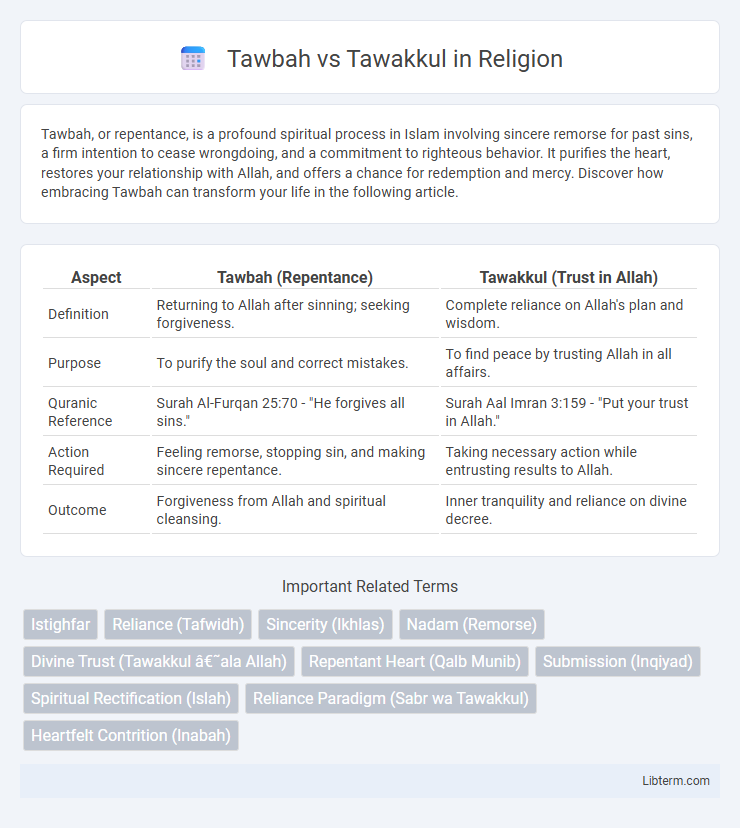Tawbah, or repentance, is a profound spiritual process in Islam involving sincere remorse for past sins, a firm intention to cease wrongdoing, and a commitment to righteous behavior. It purifies the heart, restores your relationship with Allah, and offers a chance for redemption and mercy. Discover how embracing Tawbah can transform your life in the following article.
Table of Comparison
| Aspect | Tawbah (Repentance) | Tawakkul (Trust in Allah) |
|---|---|---|
| Definition | Returning to Allah after sinning; seeking forgiveness. | Complete reliance on Allah's plan and wisdom. |
| Purpose | To purify the soul and correct mistakes. | To find peace by trusting Allah in all affairs. |
| Quranic Reference | Surah Al-Furqan 25:70 - "He forgives all sins." | Surah Aal Imran 3:159 - "Put your trust in Allah." |
| Action Required | Feeling remorse, stopping sin, and making sincere repentance. | Taking necessary action while entrusting results to Allah. |
| Outcome | Forgiveness from Allah and spiritual cleansing. | Inner tranquility and reliance on divine decree. |
Understanding Tawbah: The Essence of Repentance
Tawbah, the essence of repentance in Islam, signifies sincere remorse for past sins combined with a firm resolve to cease wrongdoing and seek Allah's forgiveness. Unlike Tawakkul, which emphasizes complete trust and reliance on Allah's plan, Tawbah centers on the proactive turning back to Allah through heartfelt remorse and corrective action. This spiritual process not only cleanses the soul but also strengthens the believer's connection to divine mercy and moral accountability.
Defining Tawakkul: Trust and Reliance on Allah
Tawakkul signifies placing complete trust and reliance on Allah's wisdom and power, believing that He controls all affairs and outcomes. It involves surrendering one's worries and efforts to Allah, acknowledging that success and relief come solely through His will. This concept is deeply rooted in Islamic teachings, emphasizing faith in divine decree while actively engaging in personal responsibility.
Quranic References to Tawbah and Tawakkul
Tawbah, or repentance, is emphasized in the Quran as a means of seeking Allah's forgiveness, with verses such as Surah At-Tahrim (66:8) urging believers to turn to Him in sincere repentance to attain mercy and purification. Tawakkul, meaning reliance on Allah, is highlighted in Surah Al-Imran (3:159) and Surah Al-Mulk (67:15), where trust in Allah's plan and provision is portrayed as a vital aspect of faith and resilience. Together, these concepts underscore a balanced approach in Islam, where personal accountability through Tawbah complements wholehearted trust through Tawakkul, as reflected in numerous Quranic injunctions.
The Spiritual Significance of Tawbah
Tawbah, the Islamic concept of sincere repentance, holds profound spiritual significance as it purifies the heart from sins and renews one's relationship with Allah, fostering inner peace and spiritual growth. Unlike Tawakkul, which emphasizes complete trust and reliance on Allah's plan, Tawbah actively requires self-reflection, remorse, and a steadfast commitment to change, making it a transformative process for the believer. Embracing Tawbah leads to the erasure of past mistakes and elevates spiritual consciousness, strengthening the believer's faith and fostering unwavering devotion.
The Role of Tawakkul in Daily Life
Tawakkul, the Islamic concept of reliance on Allah, plays a crucial role in daily life by encouraging believers to take responsible action while trusting in divine wisdom and outcomes. It fosters mental resilience and reduces anxiety by reinforcing the belief that ultimate control rests with Allah, regardless of human effort. While Tawbah emphasizes repentance and seeking forgiveness for past mistakes, Tawakkul focuses on proactive faith and surrender, enabling a balanced approach to challenges and decision-making.
Key Differences: Tawbah vs Tawakkul
Tawbah refers to the act of sincere repentance and seeking forgiveness from Allah for past sins, emphasizing remorse and commitment to change behavior. Tawakkul involves placing complete trust and reliance on Allah's wisdom and provision after making an effort, reflecting confidence in divine decree. The key difference lies in Tawbah addressing past mistakes through repentance, whereas Tawakkul centers on future reliance and surrender to Allah's plan.
How Tawbah Complements Tawakkul
Tawbah, the sincere act of repentance, complements Tawakkul by purifying the heart and removing barriers that hinder complete trust in Allah's plan. This spiritual cleansing enhances reliance on divine wisdom, allowing believers to embrace Tawakkul with conviction and peace. Together, Tawbah and Tawakkul foster a dynamic cycle of humility, submission, and unwavering faith in Allah's mercy and guidance.
Practical Steps for Practicing Tawbah
Practicing Tawbah involves sincere repentance through acknowledging one's mistakes, feeling genuine remorse, and making a firm intention not to repeat the sin. Essential practical steps include immediately stopping the sinful behavior, seeking forgiveness through specific dua or prayers, and performing good deeds to compensate or counterbalance the wrong actions. Regular self-reflection and maintaining a close connection with Allah through consistent worship reinforce the commitment to Tawbah and spiritual growth.
Cultivating Tawakkul in Challenging Times
Cultivating tawakkul, or trust in Allah's plan, during challenging times involves embracing patience and reliance on divine wisdom while proactively seeking solutions. Tawakkul complements tawbah, the act of sincere repentance, by fostering a mindset that balances accountability with hopeful surrender to Allah's decree. Strengthening this spiritual trust enhances resilience and provides inner peace amid adversity, anchoring believers in unwavering faith.
Harmonizing Repentance and Reliance in Faith
Tawbah (repentance) and Tawakkul (reliance on God) harmonize by fostering a balanced spiritual approach where believers acknowledge their flaws and seek forgiveness while fully trusting in God's wisdom and plan. Tawbah purifies the heart by recognizing mistakes and turning back to Allah, whereas Tawakkul strengthens faith through complete dependence on divine support in all circumstances. Integrating both concepts enhances resilience and humility, promoting a sincere, proactive relationship with God that encompasses accountability and unwavering trust.
Tawbah Infographic

 libterm.com
libterm.com